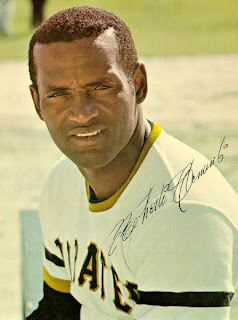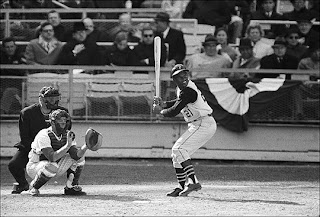 02/15/2007 3:31 PM ET
02/15/2007 3:31 PM EThttp://www.baseballhalloffame.org
In the direct aftermath of the unexpected death of Roberto Clemente in a New Year's Eve plane crash, the Cleveland Plain Dealer became one of the first media outlets to champion the cause of a special Hall of Fame election for the deceased superstar. "It would mean breaking a rule or two," the newspaper's editor wrote in its January 2, 1973 edition, "but under the circumstances, the baseball writers might want to consider immediate enshrinement in the Hall of Fame."
Jack Lang, the secretary-treasurer of the Baseball Writers' Association of America (BBWAA) at the time, announced that his organization would explore the possibility of holding a special ballot. The president of the BBWAA, Joe Heiling, supported the idea. "He would have been elected and inducted in his first year eligible," said Heiling, comparing Clemente to first-ballot Hall of Famers like Sandy Koufax and Stan Musial. "So why wait?" Commissioner Bowie Kuhn, having been contacted by the Baseball Writers, added his support to the movement for a special election.
At the time, the writers were in the midst of holding their regular Hall of Fame election, and about 30 writers had already returned ballots with Clemente's name written in, even though no decision had been made on his eligibility. The write-in votes for Clemente indicated the growing support for his election by the writers.
Under the Hall of Fame's election rules at the time, players had to wait five years after the end of their playing careers before they could become eligible. Yet, Lang cited a precedent involving New York Yankees' great Lou Gehrig. In 1939, the writers had waived the traditional waiting period so that Gehrig, who was dying from Amyotrophic Lateral Sclerosis (ALS), could enter the Hall of Fame before his passing.
 1955: Clemente with Roman Mejias & Felipe Montemayor
1955: Clemente with Roman Mejias & Felipe MontemayorOn January 3, the Hall of Fame's Board of Directors announced that it had amended its eligibility rules in the case of Clemente, and would allow the BBWAA to hold a special election. On March 20, 1973, 30 years ago this week, the BBWAA announced that Clemente had received 393 out of 424 votes on ballots cast-good for 93 percent of the vote-which put him well over the 75 percent required for election. Only six previous Hall of Famers had received a higher percentage of the vote at the time: Ty Cobb, Babe Ruth, Honus Wagner, Bob Feller, Ted Williams and Stan Musial.
Of the 31 "non-votes" in the Clemente election, about half of the writers attached explanatory notes stating they were not actually voting against Clemente, but against the decision to waive the five-year waiting period.
Six years after Clemente's election, the tragic death of Yankee star Thurman Munson once again raised awareness of the Hall of Fame's election rules. By then, the Hall of Fame had already altered its voting procedure for such tragic circumstances. In August 1973, the Hall instituted a new rule that allowed a deceased player to become eligible for the next regular election scheduled to occur at least six months after the player's date of death. Munson, who also died in a plane crash-on August 2, 1979-and coincidentally was Clemente's teammate with the San Juan Senators during the 1969-1970 winter league season, thus became eligible for the Hall's ballot for the first time in 1981.
 On August 6, 1973, fans, baseball dignitaries and Pirate officials gathered in Cooperstown to witness the induction of Clemente into the game's shrine. Clemente's Pirate teammates also attended the ceremony. (As a tribute to Clemente, the Hall of Fame and the National League had agreed to substitute the Pirates for the Phillies in the annual Hall of Fame Game scheduled for later in the day.) Ironically, Clemente's induction coincided with that of Monte Irvin, his boyhood hero. Also inducted that day were Billy Evans, George Kelly, Warren Spahn and Mickey Welch. Standing at the podium in front of thousands of onlookers, Commissioner Bowie Kuhn read from Clemente's newly created Hall of Fame plaque:
On August 6, 1973, fans, baseball dignitaries and Pirate officials gathered in Cooperstown to witness the induction of Clemente into the game's shrine. Clemente's Pirate teammates also attended the ceremony. (As a tribute to Clemente, the Hall of Fame and the National League had agreed to substitute the Pirates for the Phillies in the annual Hall of Fame Game scheduled for later in the day.) Ironically, Clemente's induction coincided with that of Monte Irvin, his boyhood hero. Also inducted that day were Billy Evans, George Kelly, Warren Spahn and Mickey Welch. Standing at the podium in front of thousands of onlookers, Commissioner Bowie Kuhn read from Clemente's newly created Hall of Fame plaque:"Roberto Walker Clemente, Pittsburgh National League 1955-1972. Member of the exclusive 3,000-hit club. He led the National League in batting four times. He had four seasons with 200 or more hits while posting a lifetime average of .317. He hit 240 home runs. He won the Most Valuable Player award in 1966. Rifle-armed defensive star set the National League mark by pacing outfielders in assists five years. He batted .362 in two World Series, hitting safely in all 14 games."
After paraphrasing the words that appeared on the plaque, Kuhn continued his address. "The directors of the Hall of Fame unanimously elected to waive the five-year waiting rule in the case of this very remarkable man. So very great was he as a player, so very great was he as a leader, so very great was he as a humanitarian in the cause of his fellow men, so very great was he as an inspiration to the young and to all of us in baseball and throughout the world of sports, and so very great was his devotion to young people everywhere and particularly to the young people of his native island of Puerto Rico. Having said all those words, they are very inadequate to describe the real greatness of Roberto Walker Clemente. We are very deeply honored to have his wife, Vera Clemente, with us here today."
 In a 1967 game against the New York Mets, Clemente shows off his coiled-spring batting stance.
In a 1967 game against the New York Mets, Clemente shows off his coiled-spring batting stance.The voice of Commissioner Kuhn, normally a stoic and reserved public speaker, wavered slightly throughout his address to those who had gathered in Cooper Park in front of the Hall of Fame's Library. "The ceremonies brought back the death and the poignancy of the death of Clemente-too soon and tragically. And I think that's what you were hearing. To me, we in baseball had simply lost one of the greatest players that we've had, one of the greatest personalities that we had, and the tragedy of it was still, I think, in my mind. It no doubt manifested itself in what I had to say and the way I said it. I'm quite clear that that would be an accurate description of how I felt," Kuhn said.
In her remarks during the ceremony, Vera Clemente said, "I want to thank the commissioner of baseball, the members of the Hall of Fame, the baseball writers, the Pittsburgh Pirates' organization and all the people who made this event possible, especially Roberto's fans who were the inspiration of his baseball career. This is a momentous last triumph, and if he were here, he would dedicate it to our people of Puerto Rico, our people in Pittsburgh, and to all his fans throughout the United States. Thank you."
With his election and induction now complete, Clemente became the first Latin American to gain enshrinement in the Hall of Fame. He would be joined in later years by Cuban Negro League star Martin Dihigo, Dominican pitcher Juan Marichal, Venezuelan shortstop Luis Aparicio, Panamanian infielder Rod Carew, Cuban slugger Tony Perez, and fellow Puerto Rican Orlando Cepeda. After the 1973 ceremony, Vera tried to offer a further reaction to her husband's history-making induction. "I have difficulty expressing the way I really feel," Vera told reporters. "It's not just for me and my children. It's a goal for all Latin American children, too."
No comments:
Post a Comment